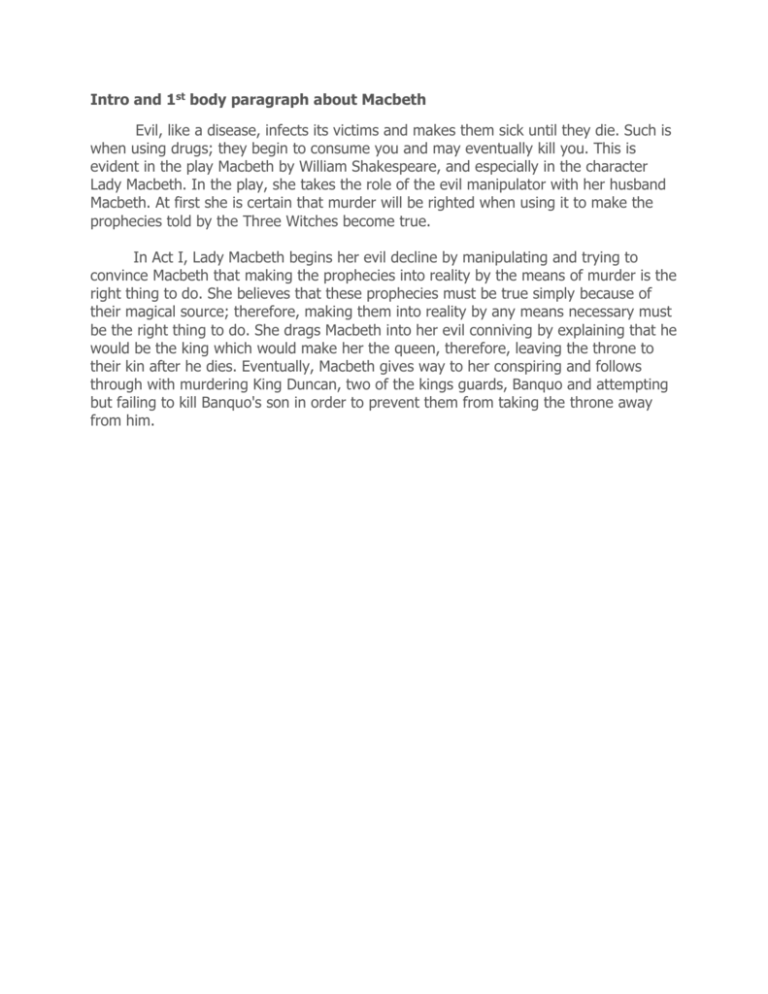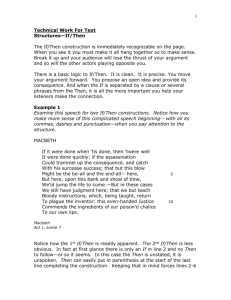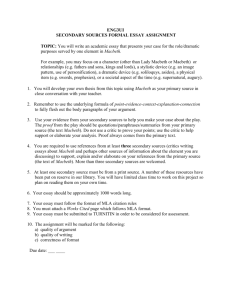Intro and 1st body paragraph about Macbeth
advertisement

Intro and 1st body paragraph about Macbeth Evil, like a disease, infects its victims and makes them sick until they die. Such is when using drugs; they begin to consume you and may eventually kill you. This is evident in the play Macbeth by William Shakespeare, and especially in the character Lady Macbeth. In the play, she takes the role of the evil manipulator with her husband Macbeth. At first she is certain that murder will be righted when using it to make the prophecies told by the Three Witches become true. In Act I, Lady Macbeth begins her evil decline by manipulating and trying to convince Macbeth that making the prophecies into reality by the means of murder is the right thing to do. She believes that these prophecies must be true simply because of their magical source; therefore, making them into reality by any means necessary must be the right thing to do. She drags Macbeth into her evil conniving by explaining that he would be the king which would make her the queen, therefore, leaving the throne to their kin after he dies. Eventually, Macbeth gives way to her conspiring and follows through with murdering King Duncan, two of the kings guards, Banquo and attempting but failing to kill Banquo's son in order to prevent them from taking the throne away from him. The Outsiders—Theme paper (without conclusion) As the title suggests, The Outsiders is a theme in itself. Looking at life as an outsider and feeling as though one is being treated as an outsider is a matter of perspective or point of view. Someone who always feels like an outsider may conclude that life is unfair. Adolescence is a time when teenagers may consider themselves to be adults, but in reality teens are still under the control of others. Parents, teachers, and other authority figures are always telling them how to live their lives. This loss of control inevitably leads to the feeling that life isn't fair. For example, Ponyboy knows that he is not safe walking the streets in his own neighborhood (23). He could be attacked solely because of the way he is dressed; he feels like an outsider in his own town. His feelings of powerlessness and vulnerability lead him to conclude that life is not fair. Ponyboy sees injustice on a daily basis. His parents are dead, Darry is forced to work two jobs to support the brothers, Soda has dropped out of school, and the greasers are looked upon as "white trash" (51). He explains that the gang warfare is actually warfare between the economic classes. Because he is from the poor, East Side of town, his place in life is unfairly predetermined. Early in the book, she associates warm colors with the Socs and cool colors with the Greasers. Warmth usually is equated with inside and cool is associated with outside, and the colors reflect the characters' positions in society: The Greasers view the Socs as insiders and themselves as outsiders. Using many descriptive colors, Hinton paints the greasers as outsiders. In her original descriptions of Ponyboy's gang, she uses cool colors: Ponyboy's eyes are greenish-gray, Darry's eyes "are like two pieces of pale blue-green ice," Dally's eyes are "blue, blazing ice, cold with a hatred," and Two-Bit Mathews has gray eyes (15, 43). THEME of Langston Hughes (without conclusion) Langston Hughes's stories deal with and serve as a commentary of conditions befalling African Americans during the Depression Era. As Ostrom explains, "To a great degree, his stories speak for those who are disenfranchised, cheated, abused, or ignored because of race or class." (51) Hughes's stories speak of the downtrodden AfricanAmericans neglected and overlooked by a prejudiced society. The recurring theme of powerlessness leads to violence is exemplified by the actions of Sargeant in "On the Road", old man Oyster in "Gumption", and the robber in "Why, You Reckon?" Hughes's "On the Road" explores what happens when a powerless individual takes action on behalf of his conditions. The short story illustrates the desperation and consequent violent actions of one man's homeless plight on a snowy winter evening. "He stopped and stood on the sidewalk hunched over- hungry, sleepy, and cold- looking up and down." (Hughes 90) Here, Sargeant is without the basic necessities of life- shelter and food. Sargeant, hopeless and starving, wanders the lonesome streets and happens upon a church. However, the reverend of the church denies Sargeant access. Mullen explains further- "And in "On the Road" an unemployed black man, given a quick brush-off by a high-toned preacher, breaks into a church" (81) When the Reverend refuses to house him, Sargeant's desperation and powerlessness leads him to commit a rash action- tear down the church door to a street of on-lookers. Shortly after, Police come to take Sargeant away and put him behind bars, where he reminisces on his actions. Had Sargeant simply had the basic means of survival, food and shelter, he would not have had done this out of desperation. In other words, Sageant's lack of security- food, shelter, and warmth, lead him to take violent actions in attempt to obtain it.








